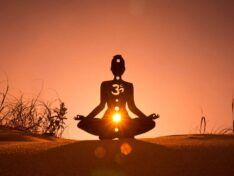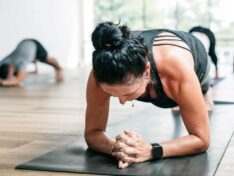Is Yoga Good for Anxiety? Diving Into the Research & Additional Considerations
Is there proof that yoga helps with anxiety? What are some helpful poses and advice when considering yoga as a possible solution?
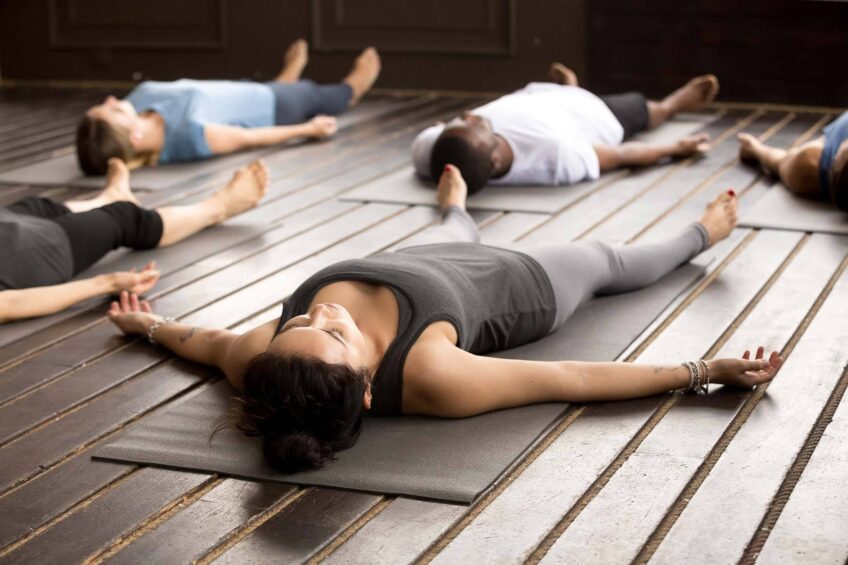
I started yoga roughly five years ago, and when people asked me about it, I told them I was doing it to increase my flexibility and combat the many hours I spend in front of the computer.
But, in truth, that was only part of the reason.
The full story was that I was burnt out, struggling to sleep, and neglecting my physical health, and it was starting to impact my mental health.
I was always tired, lethargic, and seemed stuck in a spiral of negative thoughts. I wasn’t alone in this; anxiety is the most common mental illness, and the Anxiety and Depression Association of America estimates that around 40 million adults across the US suffer from anxiety (about 18% of people over 18).
Enter yoga.
I read many articles on the power of yoga to combat various illnesses, including anxiety and depression. I was skeptical initially because most of my concerns were about my mental health, not physical health. How was learning to touch my toes going to help with this ongoing feeling of borderline depression?
But, I wanted to find a natural solution to incorporate into my fitness routine. So, naturally, I started doing more research.
I found, time and time again, that studies show, yes, overwhelmingly, that yoga is good for anxiety.
My personal experience is, without a doubt, proof of yoga’s positive mental health effects. However, let’s get into the facts.
What Does the Research Say?
The American Psychological Association cites yoga as a complement to psychotherapy, with multiple studies confirming that yoga can calm our nervous system.
Consider that:
- Yoga can help with mild depression and sleep problems
- Ten sessions of hatha yoga (a style of yoga that combines poses and breathing exercises) lowers anxiety and stress
- Twelve sessions of Iyengar yoga (focusing on the precision and detail of yoga poses) were found to have anxiety and mood benefits and outperformed metabolically matched walking exercise
- Yoga reduces inflammation caused by chronic stress
- 12 weeks of Kundalini yoga increased emotional resilience (as well as executive functioning)
- Yoga counteracts anxiety and other psychiatric disorders
With the research showing that yoga can be an essential tool for dealing with anxiety, I wanted to take a closer look at the why — what is it about yoga that makes it so effective?
Why is Yoga Good for Mental Health?
Yoga combines the three most common relaxation strategies (breathing exercises, progressive muscle relaxation, and visualization) to help you feel calmer and more in control.
In addition, regular yoga practice eases stress and enhances mindfulness. This translates into several benefits that directly impact our mental well-being.
Regular yoga practice can:
- Help us become more comfortable with being uncomfortable. Before I started yoga, a friend shared this insight with me. She said that yoga helps her lean into discomfort instead of shying away. As you practice leaning into discomfort with your physical body, you become better able to do the same with mental and emotional challenges.
- Reduce tension. Yoga poses release physical tension that is stored up (particularly in the shoulders and neck), which releases mental stress and encourages relaxation.
- Regulate the nervous system. Yoga focuses on breath work, transforming anxious breathing characterized by rapid, shallow breaths into slow and deeper breaths, which soothes the nervous system.
- Increase body awareness. By recognizing and identifying areas of tension in the body, we can learn to let go of it.
- Prevent negative thought cycles. A yoga session takes the focus off our internal struggles as we focus on our bodies and breathing.
- Form an important part of self-care. Getting caught up in work and busyness makes it much easier to neglect what we need most, such as exercise, sleep, and healthy, nutritious food. A regular, scheduled yoga class helps to reset that mindset, making it easier to do the next right thing (such as choosing a salad over a donut at lunchtime), and consecutive good decisions reduce anxiety.
- Help us meet others. Anxiety can make us more insular as we shut ourselves off from the world, leading to loneliness. Joining a regular yoga class can combat this, as you socialize naturally before and after a class.
What Are the Best Poses for Reducing Anxiety?
While many yoga poses can help with anxiety and stress, if you have just 10 or 15 minutes, these five poses will help to release tension and move you towards a state of relaxation:
Child’s Pose
This post of rest is often used between more challenging postures. It gently relaxes the front of the body while stretching the back, neck, and shoulders.
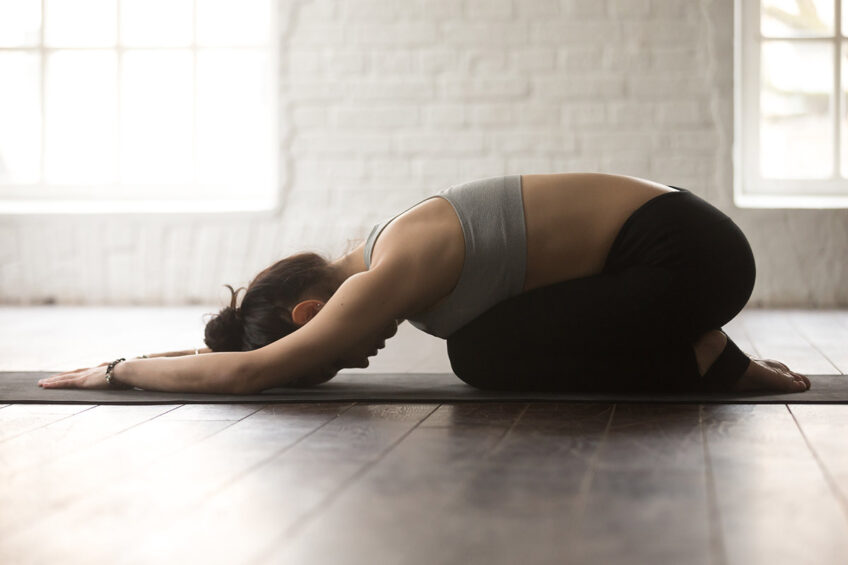
This pose centers the body and mind, effectively relieving stress.
Cat-Cow Pose
This pose brings relaxation and release as you focus on moving between the cat and cow pose with each inhale and exhale. It’s often used to warm up the body and introduce flexibility to the spine, stretching the back and neck and opening up the chest to encourage slow, deep breaths.
I used to have periods in my life where anxiety would wake me in the middle of the night. This was my go-to pose to breathe through my anxiety.
Tree Pose
This pose takes a lot of practice and concentration, so it’s very effective in taking your mind off anxious thought processes as you have to focus on your physical self.
It requires concentration and physical awareness and combats our tendency to hunch over by rooting you down through your feet as your upper body stretches and lengthens towards the sun.
Warrior III
Poor digestion and gut health have been linked to anxiety and other mental health conditions, which can be addressed, in part, with certain yoga poses. One of these is Warrior III.
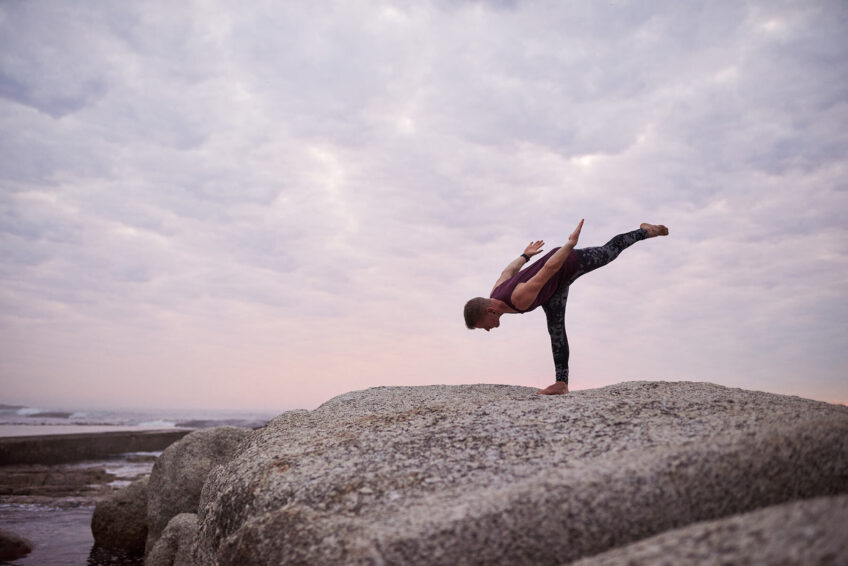
The pose enhances core strength and stimulates the abdominal region, aiding digestion. In addition, it also promotes relaxation by directing your mind to your physical body and away from unhealthy thoughts.
Corpse Pose, aka Savasana
This pose is physically easy but mentally challenging. It helps you identify any areas in the body where you may be holding tension and then release the tension through deep breaths.
By focusing on your breath, you learn to clear your mind of other distractions, creating space for you to return to a calm place.
When yoga instructors say this is the most important pose, they are 100% correct.
What Are My Thoughts?
Yoga is a journey, and I have good days and bad days. But, the power of yoga for reducing anxiety is undeniable.
Not only does the physical practice of yoga asanas create a space in the day where unhelpful thought processes are redirected to your breath and your physical body, but it also translates into the times when you’re not doing yoga.
Think about it -- where else can you experience all the roller-coaster emotions that anxiety brings?
Being sweaty in a group hot yoga class, heart-pounding, and coordinating next-to-impossible poses while just breathing through it all? It’s the best kind of anxiety-exposure therapy you can get! However, beginner yoga might be worth looking into first.
For me, this is most noticeable during times of heightened stress, such as a text or call from someone that would typically be a trigger.
Yoga has taught me to take a few deep breaths before answering the communication, which helps to prevent anxious thoughts from taking up space in my head.
Also, during a stressful conversation where I can feel myself becoming angry or defensive, I’m more able to identify the triggers and pause a moment before responding, which means that I can respond (thoughtfully) instead of reacting (in anger).
A recent post by Kelly Pietrangeli on Tiny Buddha expresses this idea well.
If you want to try yoga as part of your mental health journey, I can recommend two ways to get started either:
- Join a local class in your community. Having the support of a passionate teacher and the commitment of a regular class makes it much easier to make progress. Three classes a week is ideal, but even one or two a week is a great place to start.
- Start at home! This approach has some limitations as you may not be able to see if you are doing the poses correctly, and you may be more tempted to skip a session as there is no one to keep you accountable. A great app, such as Down Dog, helps with home-based sessions.
Whichever option you choose, I encourage you to make a start; however small, your mind (and your body) will thank you!
Tony Lee, MS, RD
Tony Lee, RD, MS, is a highly qualified and accomplished Registered Dietitian with a Master’s Degree in Nutrition Sciences. Tony brings over two decades of experience in dietetics, specializing in sports nutrition. Interests include studying all aspects of wellness, fitness, genetics, and peak health performance.













